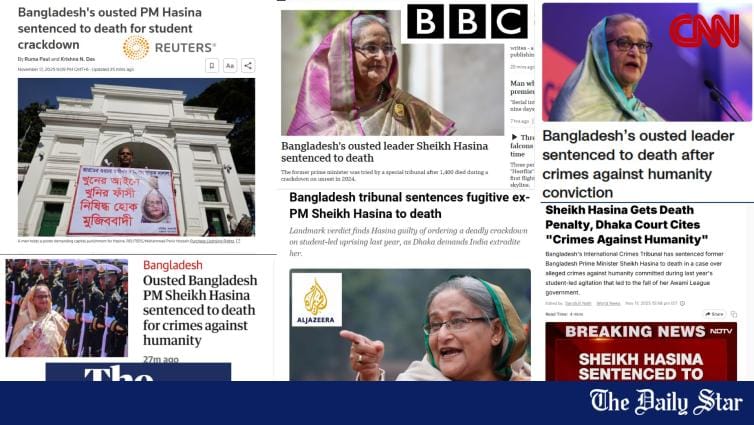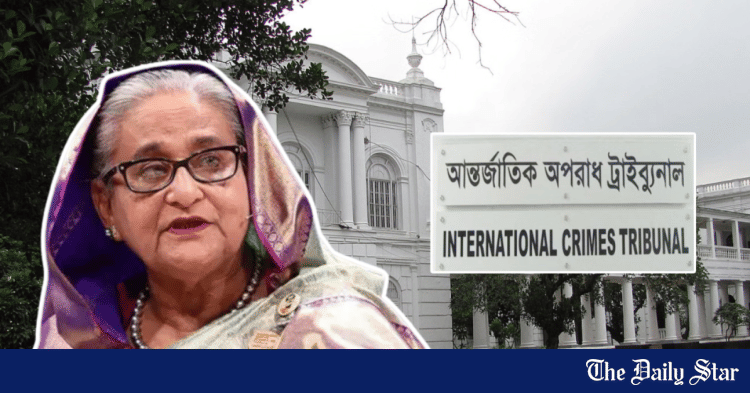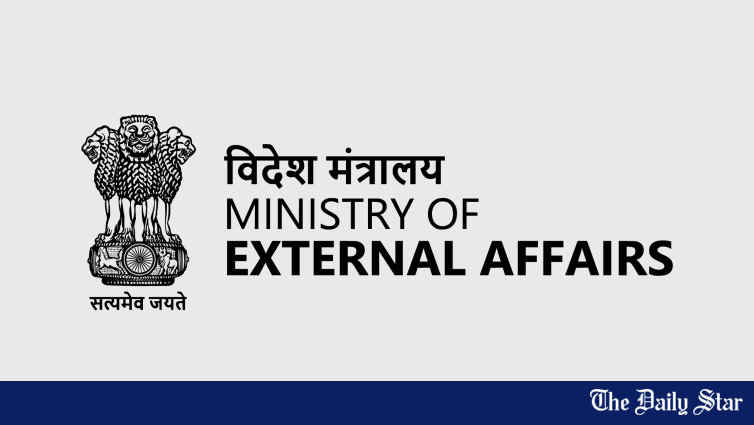Saif
Senior Member
- Joined
- Jan 24, 2024
- Messages
- 15,482
- Nation

- Axis Group

Date of Event:
Nov 18, 2025
TRIBUNAL VERDICT OVER UPRISING-TIME CRIMES AGAINST HUMANITY
Ousted PM Hasina sentenced to death
• Ex-home minister Kamal gets capital punishment • Then IGP Mamun's penalty commuted to 5yrs in jail • Govt ordered to confiscate convicts' property
GULAM RABBANI
Published :
Nov 18, 2025 00:21

Bangladesh's ousted prime minister Sheikh Hasina was Monday sentenced to death for the "crimes against humanity" committed during the July-August mass uprising last year that toppled her government.
In its verdict telecast live, the International Crimes Tribunal-1 (ICT-1) in Dhaka also handed down capital punishment to former home minister Asaduzzaman Khan Kamal but commuted the penalty to then inspector-general of police (IGP) Chowdhury Abdullah Al-Mamun for "full disclosure" of the offences as a penitent approver.
The court also ordered confiscating all the property of Hasina and Kamal in favour of the state, and to give adequate compensation to the martyr families and July survivors in consideration of their losses.
A three-member bench of the tribunal, headed by its Chairman Justice Md Golam Mortuza Mozumder, delivered the verdict in the prime case of committing crimes against humanity during the uprising. The two other members of the bench are Justice Md Shofiul Alam Mahmood and former District and Sessions Judge Md Mohitul Haque Enam Chowdhury.
Hasina and Kamal have been absconding and tried in absentia while Mamun is in custody and pleaded guilty. The then police chief also becomes an approver or state witness in the tribunal, set up in 2010.
According to the judgment, Hasina, 78, who is now in India, was sentenced to death under charge no 2 on three counts of crimes.
The offences involve directing the use of lethal weapons, deploying helicopter and drones, the shooting and killing of six unarmed protesters in Dhaka's Chankharpool on August 5 last year, and the shooting of six student protesters in Ashulia the same day, five of whom were later burned after death, while the sixth was allegedly set on fire while still alive.
Hasina was also sentenced to imprisonment unto natural death on another three counts under Charge No 1. The offence counts include incitement and orders to kill the protesters, as well as failure to prevent the atrocities that occurred during the mass uprising.
Asaduzzaman Khan Kamal also received the death penalty on three counts under Charge No 2, which involved his abetment and failure to prevent the shooting and killing of six unarmed protesters in Dhaka's Chankharpool on August 5 last year, as well as the shooting of six student protesters in Ashulia the same day. Five of the students were later burned after death, while the sixth was allegedly burnt alive.
The tribunal states that the former Home Minister and the former IGP committed the same offences by abetting the crimes carried out during the mass uprising, and that the IGP was also liable to receive the highest punishment for his actions. However, the tribunal decided to impose a more "lenient sentence" on him, noting that he had contributed to the trial proceedings by making a "truthful disclosure" of the facts.
"He was involved in all the crimes committed during the 36-day movement. He should receive the highest punishment for his actions. However, we acknowledge that he made a full disclosure of the crimes to the tribunal and contributed to the trial proceedings," the tribunal says.
In an instant reaction Attorney-General Md Asaduzzaman said the martyrs, the state and the prosecution received justice.
He further told the press: "We believe this verdict is a landmark decision in fulfilling our responsibility to the martyrs, to the country, to the people, to the Constitution, to the rule of law, and to future generations. This verdict will bring peace and it is a message for the future. It will stand as a milestone for justice and the rule of law in Bangladesh."
Chief Prosecutor Muhammad Tajul Islam says the government can take two steps to bring back the two absconding accused from India. It can either request the Indian government to hand them over under the existing extradition treaty, or seek their return through Interpol in order to implement the verdict.
State defence counsel Md Amir Hossain says he was distressed, as his client received the highest punishment in the case. He says he has no locus standi to file an appeal because his clients are fugitives.
Families of those killed and injured during the July uprising welcome the death sentences handed down to the deposed prime minister, Sheikh Hasina, and former home minister Asaduzzaman Khan Kamal, calling the verdict a long-awaited step toward justice. They also urge the government to ensure the verdict is carried out "swiftly".
In his reaction, Mir Mahbubur Rahman Snigdho, the twin brother of July martyr Mir Mahfuzur Rahman Mugdho, says the martyr families agreed with the death sentences for Sheikh Hasina and Asaduzzaman Khan Kamal but rejected Mamun verdict.
"We will appeal to the higher court. He must receive at least life imprisonment," he told the reporters on the high-security ICT premises.
He notes that delivering a verdict is not enough-the government must also clarify how it intends to bring back Hasina and Kamal.
The tribunal, headed by the presiding judge, Justice Md Golam Mortuza Mozumder, began reading out portions of the 453-page judgment around 12:30pm, amid tight security and a packed courtroom.
The tribunal states that the offences committed by the accused constitute crimes against humanity under the Rome Statute. It further says, "Justice must not be denied."
The witnesses and evidences produced in the tribunal were enough to prove the crimes against the accused. The genuineness of the video and audio clips was beyond question and 54 witnesses were enough to prove the charges.
Law-enforcement personnel, including members of the Bangladesh Army, were deployed on the tribunal premises. Prosecutors, defence counsel, visitors, and journalists were allowed entry only after thorough security checks.
Pronouncement of the verdict was broadcast live with the permission of the tribunal.
Before delivering the order portion, the tribunal said, "The prosecution prayed to give decision over Awami League activities in the verdict. However, the tribunal isn't inclined to discuss the issue in the verdict as it is not the matter involved in the case."
The tribunal had declared the end of the trial proceedings on October 23 this year and on November 13 it set November 17 for delivering its verdict in the case.
On June 1 this year, the prosecution submitted the formal charges to the tribunal, detailing five specific crimes against humanity, including "superior command responsibility" committed during the uprising.
On all five charges, the accused are charged with crimes against humanity, including murder, attempted murder, widespread and systematic killings, incitement, provocation, aiding and abetting, conspiracy, other inhumane acts, and failure to prevent the commission of these crimes.
Provocative speech of Sheikh Hasina given at a press conference on July 14 last year at the Gonobhaban, direction to use of helicopters, drones and lethal weapons during the student-led quota movement, and implementation of that direction by the subordinates to former Home Minister Asaduzzaman Khan Kamal and former IGP Chowdhury Abdullah Al Manmun have been included in the charges.
Ousted PM Hasina sentenced to death
• Ex-home minister Kamal gets capital punishment • Then IGP Mamun's penalty commuted to 5yrs in jail • Govt ordered to confiscate convicts' property
GULAM RABBANI
Published :
Nov 18, 2025 00:21
Bangladesh's ousted prime minister Sheikh Hasina was Monday sentenced to death for the "crimes against humanity" committed during the July-August mass uprising last year that toppled her government.
In its verdict telecast live, the International Crimes Tribunal-1 (ICT-1) in Dhaka also handed down capital punishment to former home minister Asaduzzaman Khan Kamal but commuted the penalty to then inspector-general of police (IGP) Chowdhury Abdullah Al-Mamun for "full disclosure" of the offences as a penitent approver.
The court also ordered confiscating all the property of Hasina and Kamal in favour of the state, and to give adequate compensation to the martyr families and July survivors in consideration of their losses.
A three-member bench of the tribunal, headed by its Chairman Justice Md Golam Mortuza Mozumder, delivered the verdict in the prime case of committing crimes against humanity during the uprising. The two other members of the bench are Justice Md Shofiul Alam Mahmood and former District and Sessions Judge Md Mohitul Haque Enam Chowdhury.
Hasina and Kamal have been absconding and tried in absentia while Mamun is in custody and pleaded guilty. The then police chief also becomes an approver or state witness in the tribunal, set up in 2010.
According to the judgment, Hasina, 78, who is now in India, was sentenced to death under charge no 2 on three counts of crimes.
The offences involve directing the use of lethal weapons, deploying helicopter and drones, the shooting and killing of six unarmed protesters in Dhaka's Chankharpool on August 5 last year, and the shooting of six student protesters in Ashulia the same day, five of whom were later burned after death, while the sixth was allegedly set on fire while still alive.
Hasina was also sentenced to imprisonment unto natural death on another three counts under Charge No 1. The offence counts include incitement and orders to kill the protesters, as well as failure to prevent the atrocities that occurred during the mass uprising.
Asaduzzaman Khan Kamal also received the death penalty on three counts under Charge No 2, which involved his abetment and failure to prevent the shooting and killing of six unarmed protesters in Dhaka's Chankharpool on August 5 last year, as well as the shooting of six student protesters in Ashulia the same day. Five of the students were later burned after death, while the sixth was allegedly burnt alive.
The tribunal states that the former Home Minister and the former IGP committed the same offences by abetting the crimes carried out during the mass uprising, and that the IGP was also liable to receive the highest punishment for his actions. However, the tribunal decided to impose a more "lenient sentence" on him, noting that he had contributed to the trial proceedings by making a "truthful disclosure" of the facts.
"He was involved in all the crimes committed during the 36-day movement. He should receive the highest punishment for his actions. However, we acknowledge that he made a full disclosure of the crimes to the tribunal and contributed to the trial proceedings," the tribunal says.
In an instant reaction Attorney-General Md Asaduzzaman said the martyrs, the state and the prosecution received justice.
He further told the press: "We believe this verdict is a landmark decision in fulfilling our responsibility to the martyrs, to the country, to the people, to the Constitution, to the rule of law, and to future generations. This verdict will bring peace and it is a message for the future. It will stand as a milestone for justice and the rule of law in Bangladesh."
Chief Prosecutor Muhammad Tajul Islam says the government can take two steps to bring back the two absconding accused from India. It can either request the Indian government to hand them over under the existing extradition treaty, or seek their return through Interpol in order to implement the verdict.
State defence counsel Md Amir Hossain says he was distressed, as his client received the highest punishment in the case. He says he has no locus standi to file an appeal because his clients are fugitives.
Families of those killed and injured during the July uprising welcome the death sentences handed down to the deposed prime minister, Sheikh Hasina, and former home minister Asaduzzaman Khan Kamal, calling the verdict a long-awaited step toward justice. They also urge the government to ensure the verdict is carried out "swiftly".
In his reaction, Mir Mahbubur Rahman Snigdho, the twin brother of July martyr Mir Mahfuzur Rahman Mugdho, says the martyr families agreed with the death sentences for Sheikh Hasina and Asaduzzaman Khan Kamal but rejected Mamun verdict.
"We will appeal to the higher court. He must receive at least life imprisonment," he told the reporters on the high-security ICT premises.
He notes that delivering a verdict is not enough-the government must also clarify how it intends to bring back Hasina and Kamal.
The tribunal, headed by the presiding judge, Justice Md Golam Mortuza Mozumder, began reading out portions of the 453-page judgment around 12:30pm, amid tight security and a packed courtroom.
The tribunal states that the offences committed by the accused constitute crimes against humanity under the Rome Statute. It further says, "Justice must not be denied."
The witnesses and evidences produced in the tribunal were enough to prove the crimes against the accused. The genuineness of the video and audio clips was beyond question and 54 witnesses were enough to prove the charges.
Law-enforcement personnel, including members of the Bangladesh Army, were deployed on the tribunal premises. Prosecutors, defence counsel, visitors, and journalists were allowed entry only after thorough security checks.
Pronouncement of the verdict was broadcast live with the permission of the tribunal.
Before delivering the order portion, the tribunal said, "The prosecution prayed to give decision over Awami League activities in the verdict. However, the tribunal isn't inclined to discuss the issue in the verdict as it is not the matter involved in the case."
The tribunal had declared the end of the trial proceedings on October 23 this year and on November 13 it set November 17 for delivering its verdict in the case.
On June 1 this year, the prosecution submitted the formal charges to the tribunal, detailing five specific crimes against humanity, including "superior command responsibility" committed during the uprising.
On all five charges, the accused are charged with crimes against humanity, including murder, attempted murder, widespread and systematic killings, incitement, provocation, aiding and abetting, conspiracy, other inhumane acts, and failure to prevent the commission of these crimes.
Provocative speech of Sheikh Hasina given at a press conference on July 14 last year at the Gonobhaban, direction to use of helicopters, drones and lethal weapons during the student-led quota movement, and implementation of that direction by the subordinates to former Home Minister Asaduzzaman Khan Kamal and former IGP Chowdhury Abdullah Al Manmun have been included in the charges.









































